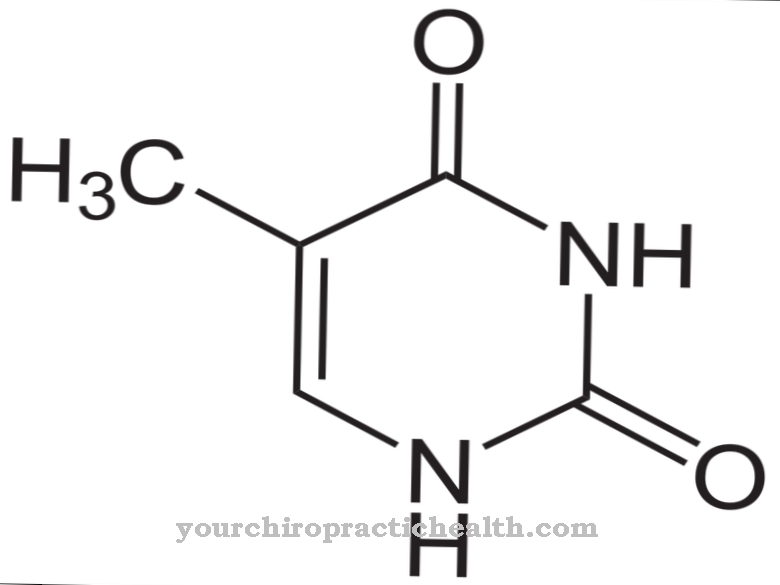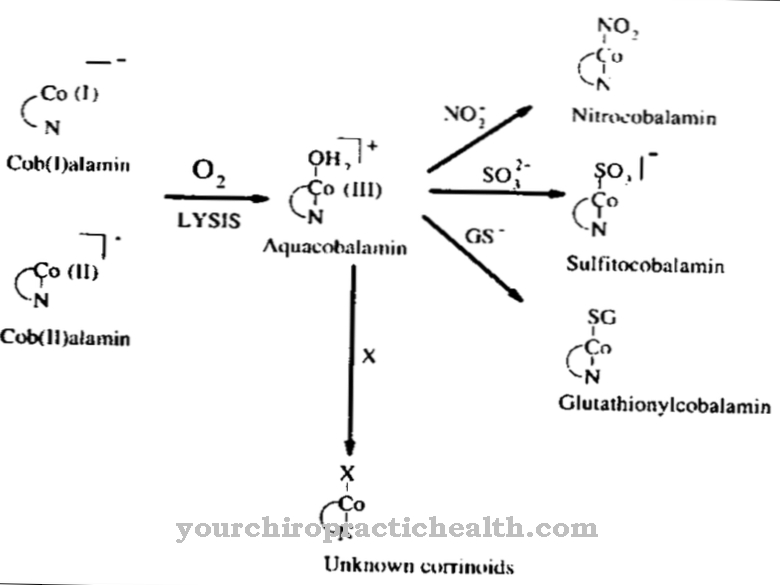Adiponectin, a hormone formed in adipose tissue in humans and animals, only has a beneficial effect on health if it is present in normal concentrations in the blood level. An increased value in the blood level can be determined especially in people who are overweight and obese patients. You are at an increased risk of developing metabolic disease.
What is adiponectin?
Adiponectin has the names GBP-28, AdipoQ and Acrp30 and belongs to the group of adipokines (fatty tissue hormones). The body makes it with the help of the APMI gene on chromosome 3q27. The production of adiponectin always takes place when the fat cells are only slightly filled.
The tissue hormone, made up of 247 amino acids, has a collagen-like structure and is responsible for regulating sugar and fat metabolism. Certain diseases such as chronic insulin regulation disorder, which is associated with a permanently increased insulin level, ensure that less adiponectin is produced in the adipose tissue.
Adiponectin administration can accelerate the breakdown of adipose tissue - a method that could be helpful in future patients who want to lose weight. In people with normal adiponectin levels, its proportion of the total proteins present in the blood serum is only 0.01 percent. The adiponectin concentration in the blood is determined using the ELISA method.
Function, effect & tasks
Adiponectin, together with leptin, insulin and other hormones, regulates glucose metabolism. It changes the way insulin works on fat cells. Hence it is also known as an immune modulator. If the adiponectin level in the blood is low, the effect of insulin is also weakened.
Since overweight people and insulin-resistant patients have low adiponectin levels, their risk of developing type 2 diabetes is significantly higher than that of people of normal weight. Adiponectin acts on the AdipoR1 and AdipoR2 receptors. AdipoR1 is located in the skeletal muscles, AdipoR2 in the liver tissue. In people with normal adiponectin levels in the blood serum, the hormone increases the sensitivity to insulin and counteracts insulin resistance. It is increasingly released when the insulin level rises briefly and promotes fat storage in the fat cells.
As an antagonist of the inflammation-promoting hormones produced in abdominal fat tissue, adiponectin has an anti-inflammatory (anti-inflammatory) effect. Therefore, people with normal adiponectin levels also have a low risk of developing arteriosclerosis. In people with obesity who also suffer from coronary heart disease, however, the low level causes even greater damage to the vascular system. In animal experiments it could be shown that animals with a too low concentration of adiponectin in the blood died more often of blood poisoning than animals with normal adiponectin blood values.
Additional administration of the tissue hormone, however, drastically reduced this risk. In addition, it inhibits the formation of new sugar (glucose) in the liver, stimulates the oxidation of fatty acids in the liver, stimulates glucose uptake in the muscles and causes the formation of insulin.
Education, occurrence, properties & optimal values
Adiponectin is made in the body's adipocytes (fat cells). However, their production is only stimulated when the adiponectin concentration in the blood serum is too low. Like the other hormone leptin produced in adipose tissue, adiponectin has an impact on glucose and lipid metabolism.
If it is present in sufficient quantities in the blood, it inhibits inflammatory processes in the body, for example on the vessel walls and cell membranes. People with normal adiponectin levels have a lower risk of developing type 2 diabetes. Scientists are now assuming that in the future the doctor will be able to use the adiponectin blood level to make a statement about whether the patient in question has an increased risk of diabetes or not. The researchers also found that patients with a genetic variant of the hormone have a significantly higher risk of developing diabetes mellitus than those with "normal" adiponectin.
In the latest clinical studies it was possible to increase the adiponectin level in the blood with the administration of certain drugs. Another way to normalize blood levels is, according to the medical community, to reduce excess weight and change your diet.
Diseases & Disorders
A pathologically low adiponectin level in the blood means that the body does not use the fatty acids stored in adipose tissue sufficiently. People with obesity not only have permanently (too) low adiponectin blood values, but also increased leptin values at the same time.
Leptin is the other hormone that is produced in adipose tissue. It usually acts to suppress appetite. However, since obesity blocks this positive effect of leptin, insulin resistance develops. The excessively high leptin concentration leads to oxidative stress and therefore to increased inflammation parameters. People with this dysfunction are at greater risk of developing type 2 diabetes, hardening of the arteries (arteriosclerosis), coronary artery disease and heart attacks. Excessively high triglyceride levels and too low HDL cholesterol levels can be found in their blood.
The total cholesterol level is also increased to a greater or lesser extent. To counteract this, doctors recommend significantly reducing weight (and therefore especially fatty tissue). A lot of exercise in the fresh air reduces the resistance to insulin in people with diabetes via the adiponectin content. However, an excessively high level of adiponectin in the blood can increase the risk of dementia in female patients. The excessively strong adiponectin secretion can also promote cirrhosis of the liver.



























